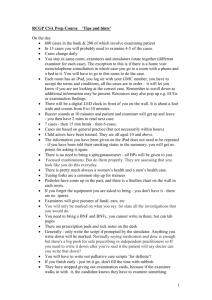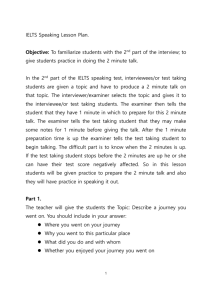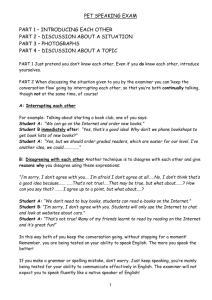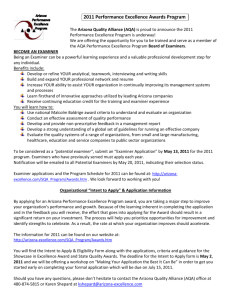Assessment Procedures Purpose
advertisement
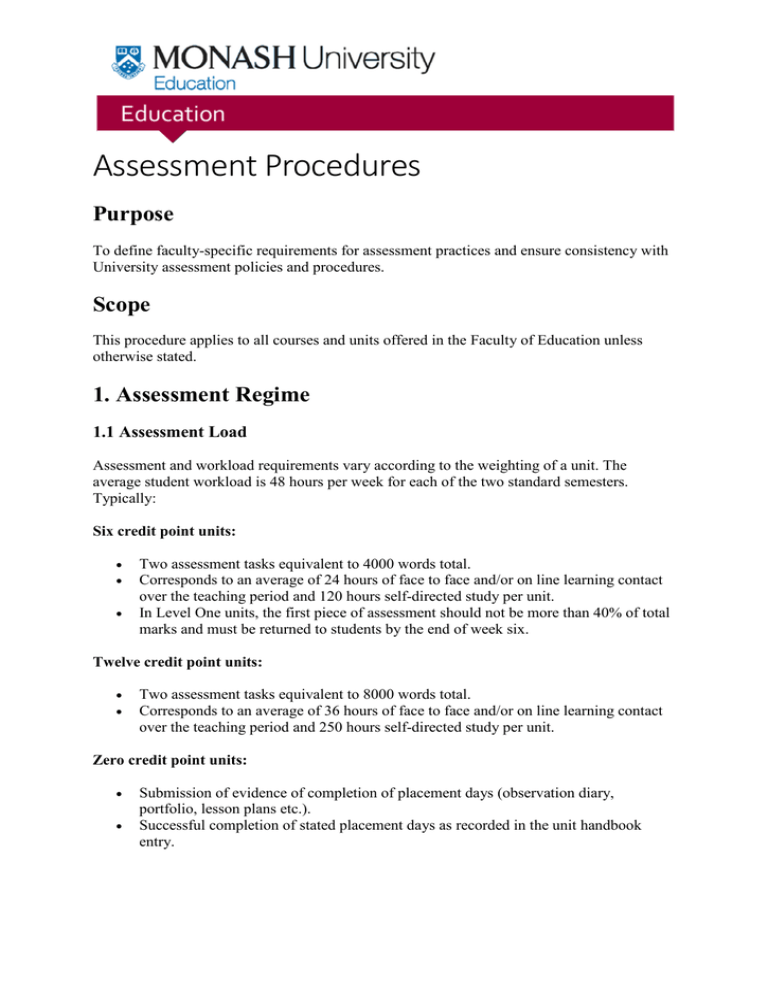
Assessment Procedures Purpose To define faculty-specific requirements for assessment practices and ensure consistency with University assessment policies and procedures. Scope This procedure applies to all courses and units offered in the Faculty of Education unless otherwise stated. 1. Assessment Regime 1.1 Assessment Load Assessment and workload requirements vary according to the weighting of a unit. The average student workload is 48 hours per week for each of the two standard semesters. Typically: Six credit point units: • • • Two assessment tasks equivalent to 4000 words total. Corresponds to an average of 24 hours of face to face and/or on line learning contact over the teaching period and 120 hours self-directed study per unit. In Level One units, the first piece of assessment should not be more than 40% of total marks and must be returned to students by the end of week six. Twelve credit point units: • • Two assessment tasks equivalent to 8000 words total. Corresponds to an average of 36 hours of face to face and/or on line learning contact over the teaching period and 250 hours self-directed study per unit. Zero credit point units: • • Submission of evidence of completion of placement days (observation diary, portfolio, lesson plans etc.). Successful completion of stated placement days as recorded in the unit handbook entry. Where students are required to complete professional experience as part of a compulsory course requirement, where possible, class activities will be limited or absent for units in the same progression year of study, during the scheduled placement period. 1.2 Attendance Requirements Prescribed attendance requirements are not permitted within the Faculty of Education. Academic staff are encouraged to ensure unit assessment types and due dates encourage student attendance. Where activities are scheduled in a venue where recording facilities are available, staff must place these on Monash University Lectures Online. 1.3 Implementation of the Assessment Regime The faculty ensures integrity of assessment is maintained through the provision and use of an assessment development checklist. Chief examiners and their teams are required review their assessment regimes through course and unit meetings (e.g Course Advisory Teams). 1.4 Amending an assessment regime Pre-semester commencement: Where the description and/or weighting of assessment is amended, Chief Examiners are required to submit a minor unit amendment for endorsement. All relevant committee approvals must be obtained prior to publishing amendments to the unit guide. Post-semester commencement: In exceptional circumstances where an amendment to the description and/or weighting of assessment requires amendment post semester commencement, Chief Examiners are required to outline the reason and rationale for the late amendment to the Associate Dean (Education). The Associate Dean (Education) approval must be obtained prior to students being notified of the amendment and minor unit amendments must also be submitted. 1.5 Extension to assessment deadlines Students may be provided with an extension of up to and including five calendar days. Students seeking an extension due to exceptional circumstances and for extensions beyond five calendar days must use the University Special Consideration Policy and Procedures (See Section 1.6). Students wishing to apply for an extension must submit a request via email to the unit coordinator (or equivalent) prior to the assessment deadline. Accepted circumstances for applying for an extension include (but are not limited to): • • Short-term illness Unforeseen employment obligations • Family circumstances If an extension is granted, students must attach a copy of the email approving the extension when submitting their assessment. Approval for an extension and the duration of extension is granted by the unit coordinator (or equivalent). In exceptional circumstances, an application for an extension may be considered by the unit coordinator (or equivalent) after the assessment due date has lapsed. Students must have been granted either an extension or special consideration in order to submit work after the published due date. 1.6 Special consideration Students seeking special consideration for assessment (extensions beyond five calendar days) are required to follow the university Special Consideration Policy and Special Consideration Procedures. Students wishing to apply for special consideration: • • Within Semester – submit to the Chief Examiner End of Semester – submit to the Faculty of Education Admissions & Student Services Office at any campus. 2. Group Work 2.1 Group assessment design Before setting group work, the Chief Examiner in conjunction with the Unit Coordinator and other members of the teaching team, need to plan the objectives of the assessment task in relation to the overall unit assessment regime. When designing the task, the assessment methodology needs to be defined. Group work is most valuable where it is designed to achieve learning objectives relating to the development of collaborative skills and aligned with Monash Graduate Attributes. Group work should not be viewed as a way of reducing the marking load. Group work requires active involvement by the teaching team, particularly in terms of monitoring problems and intervening should a group become dysfunctional. 2.2 Managing group work Group work assessment tasks must be carefully planned and managed to minimise student complaints and general dissatisfaction. Students must be given clear information about key aspects of the task in the unit guide. The Chief Examiner needs to ensure that: • The objectives of the assessment task are clearly stated (including how they link to the unit and course learning objectives/graduate attributes) • • • Students know how the groups will be formed Information is captured about each member's contribution so that individual performance can be evaluated if necessary Problems are identified at an early stage so that intervention can occur in time to keep the task on track. 2.3 Managing dysfunctional groups If a problem arises that seems insurmountable, the Unit Coordinators under the guidance of the Chief Examiner should have an alternate plan in place, such as splitting the group or specifying additional individual assessment. However, if the purpose of the group is to develop collaborative skills, a student who is unable to perform well in the group and who is not displaying these skills may be assigned a fail for the task, provided the situation and circumstances have been fully investigated first. 3. Dissemination of information to students Chief Examiners are responsible for ensuring that students are provided with assessment details in the unit guide which adhere to Section C.1 of the University Unit assessment Procedures. 4. Feedback to students 4.1 Timing of feedback Academic staff should return the first assessment task to students within 15 working days of the due date. Subsequent assessment tasks should be returned within 20 working days of the due date. 4.2 Quality of feedback Students can expect to receive feedback that helps them to understand why they attained the grade awarded. Feedback should be directly related to the assessment criteria. Feedback can be in the form of: • • • • • A completed rubric and written comments on student's work Oral comments from teaching staff to commend and/or correct the student learning Oral comments in group sessions Provision of sample answers for the assessment tasks An audio file and/or video 5. Marking, grading and results 5.1 Ensuring consistency in marking and grading When a unit is in multiple modes and locations the Chief Examiner is responsible for ensuring the marking and results of each assessable task are reviewed to ensure equivalency and consistency. All coursework assessment awarded unsatisfactory grades must be reviewed by a second assessor using the principles of blind marking. 5.2 Resubmission of work To support student transition, students enrolled in level one undergraduate study (i.e. EDF1XXX) may be permitted by the Chief Examiner to resubmit the first assessment task. The maximum grade that can be awarded on resubmission is a pass. Students in subsequent year level units, or first year students who fail the second assessment piece, may only be permitted to resubmit an assessment piece if awarded an overall final grade between 45-49N. In these cases, university criteria of supplementary assessment rules must be met. The supplementary assessment grade of NS can only be awarded at Board of Examiners. The Faculty may award a supplementary grade of NS where a student has not passed all units in exceptional circumstances - e.g in a teach out arrangement where a unit (or approved equivalent) will no longer be offered. If a student is awarded a supplementary assessment grade of NS at the Board of Examiners, the Chief Examiner is responsible for determining whether the student is required to: • • Resubmit an assessment piece based on feedback provided Submit a new assessment piece Results for supplementary assessment must be made available by the date specified by the Board of Examiners. 5.3 Review of an assessment task result The review of assessment tasks policy does not apply to professional experience units. There is no automatic right for a second grading of satisfactory work, except in the case where an error has occurred in either policy or procedure. Students are required to initiate informal resolution within two weeks of receiving their assessment task result. The onus in all cases is on the student to outline the error in either policy or procedure. The order of contact is as follows: • • • The assessor (teaching associate or unit coordinator) In the event that the matter is not resolved after discussion with the assessor (teaching associate or unit coordinator) then the Chief Examiner of the unit. The matter will only be referred to the Courses Leader when the assessor and Chief Examiner are the same person. The assessor and/or Chief Examiner will determine whether reasonable grounds for a second marking have been established. • • • • If grounds are determined, a blind copy remarking of the assessment task by another assessor will be arranged. If no grounds are determined, the student will be advised of the reasons why this decision has been made. In all cases, the decision will be communicated to the student within two weeks of request. If still unresolved, the student should be referred to the Faculty Grievance procedures. In all circumstances, where a student's work is remarked because of an error, the last mark must stand. 5.4 Review of an overall unit result The review of an overall unit result policy does not apply to professional experience units. There is no automatic right for a second grading of satisfactory work, except in the case where an error has occurred in either policy or procedure. Students are required to initiate informal resolution within two weeks of receiving their final result. The onus in all cases is on the student to outline the error in either policy or procedure. The order of contact is as follows: • • The Chief Examiner The Courses Leader The Chief Examiner/Courses Leader will determine whether reasonable grounds for a second marking have been established. • • • • If grounds are determined, a blind copy remarking of the unit assessment tasks by another assessor will be arranged. If no grounds are determined, the student will be advised of the reasons why this decision has been made. In all cases, the decision will be communicated to the student within two weeks of request. If still unresolved, the student should be referred to the Faculty Grievance procedures. In all circumstances, where a student's work is remarked because of an error, the last mark must stand. 5.5 Distribution of grades It is the Chief Examiner's responsibility to determine whether scaling of marks is required to ensure equality of outcomes across different cohorts of students. Where outcomes and grade distributions are inconsistent across modes or campuses without justification, the Chief Examiner may decide to adjust marks across a unit prior to the Board of Examiners. Where an adjustment of marks has been made by the Chief Examiner, the extent and rationale for the amendments must be reported by the Chief Examiner at the relevant Board of Examiners meeting. Supporting policies Assessment in Coursework Units Policy Supporting procedures Unit Assessment Procedures (uni-wide) Supporting documents Faculty Assessment Development Checklist Responsibility for implementation • • • • Associate Dean (Education) Director, Student Experience Faculty Manager Manager, Admissions and Student Services Status Amended Key stakeholders • • • Program Management Sub-Committees Student Engagement Committee Education Portfolio Endorsement body Name: Education Committee Meeting: 4a/14 Date: 26 September 2014 Agenda item: 1.1 Approval body Name: Faculty Executive Committee Meeting: 9/14 Date: 7 October 2014 Agenda item: 7.3 Date effective 7 October 2014 Policy owner Associate Dean (Education) Faculty Manager Policy author Manager, Admissions & Student Services Content enquiries Admissions & Student Services Office, Faculty of Education
